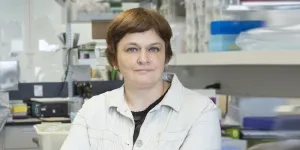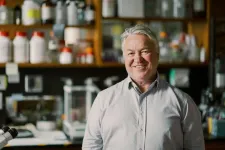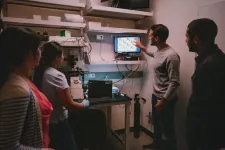(Press-News.org) Researchers at Université de Montréal’s affiliated hospital research centre, the CRCHUM, say the discovery could help lessen and even eliminate viral loads in people undergoing antiretroviral therapy.
Metformin, a drug used to treat type 2 diabetes, could help deplete the viral reservoir and eliminate it entirely in people living with HIV who receive antiretroviral therapy, Canadian researchers say in a new study.
In 2021, a team led by immunologist Petronela Ancuta of Université de Montréal’s affiliated hospital research centre, the CRCHUM, showed that metformin, when taken for three months, improved patients’ immunity and reduced the chronic inflammation usually associated with complications such as cardiovascular disease.
One reason these benefits are so effective is that metformin inhibits the activity of the mTOR (mechanistic target of rapamycin) molecule, which in turn slows down HIV replication in the cells of patients infected with the virus.
In the journal iScience, Ancuta and her student Augustine Fert, the study’s first author and a recent Ph.D. holder, go further. They studied the molecular mechanisms of action of metformin on HIV replication in CD4 T lymphocytes, which are immune system cells that provide shelter for the virus.
In these reservoirs, HIV keeps on replicating, which contributes to the chronic inflammation by constantly activating the immune system.
“The results of our in vitro tests on cells from people living with HIV and treated with antiretroviral therapy caught us off guard at first,” said Ancuta. “They were a bit surprising. We discovered that metformin had both a proviral and an antiviral effect. The drug helped boost the number of HIV-infected cells, while also stopping the virus from escaping the cell.”
Antibodies to the rescue
Another benefit of metformin is that it overexpresses the BST2 protein, which acts as a kind of glue to keep virions clinging to the surface of HIV-infected cells. The immune system then spots them and can target them with antibodies.
“Together with my colleague Andrés Finzi, we tested the ability of several broad-spectrum neutralizing anti-HIV antibodies to recognize viral reservoir cells after metformin exposure in vitro,” said Ancuta. “Some of them recognized the virus very well, suggesting their ability to attract and trigger the destruction of infected cells by NK cells through a process of cellular cytotoxicity.”
These recent scientific advances mean that the “shock-and-kill” eradication strategy, often used in the fight against HIV, can be foreseen in a different way, she added.
“In people living with HIV and treated with antiretroviral therapy, we could use metformin to reactivate the reservoir cells responsible for viral replication upon treatment interruption, in combination with antibodies that are already used clinically and well tolerated. These antibodies can then detect the rare infected cells and eliminate them.”
In the next phase of her research, Ancuta plans to launch a clinical trial to validate her in vitro research results, in collaboration with Finzi and their CRCHUM colleague Nicolas Chomont, and Jean-Pierre Routy of the McGill University Health Centre Research Institute.
Before she can move forward with this strategy, she will test it in preclinical models.
Science writing: Bruno Geoffroy
###
About this study
“Metformin facilitates viral reservoir reactivation and their recognition by anti-HIV-1 envelope antibodies,” by Augustine Fert under the supervision of Petronela Ancuta et al., was published online in iScience on Aug. 8, 2024. The study received funding from the Canadian Institutes of Health Research, the Canadian Consortium for HIV Cure Research (CanCURE), the Canadian Foundation for AIDS Research (CANFAR), the International AIDS Society (IAS), the Fonds de recherche du Québec and the Fondation du CHUM. Also involved in the study were Dominique Gauchat, Philippe Ste-Onge and Gaël Dulude of the CRCHUM’s cytometry platform, and Olfa Debbeche and Laurent Knafo of the CRCHUM’s containment level 3 (CL3) platform, as well as Mario Legault of the Réseau VIH/SIDA-Maladies infectieuses.
About the CHUM Research Centre (CRCHUM)
Université de Montréal's affiliated hospital research centre, the CRCHUM, is one of North America’s leading hospital research centres. It strives to improve the health of adults through a continuum of research spanning disciplines such as basic science, clinical research and population health. About 2,130 people work at CRCHUM. These include more than 550 researchers and nearly 530 graduate students and postdoctoral fellows. crchum.com
About Université de Montréal
Deeply rooted in Montréal and dedicated to its international mission, Université de Montréal is one of the top universities in the French-speaking world. Founded in 1878, Université de Montréal today has 13 faculties and schools, and together with its two affiliated schools, HEC Montréal and Polytechnique Montréal, constitutes the largest centre of higher education and research in Québec and one of the major centres in North America. It brings together 2,300 professors and researchers and has close to 67,000 students. umontreal.ca
END
Dr. Berna Hascakir, professor in the Harold Vance Department of Petroleum Engineering at Texas A&M University, was selected as part of a $17 million grant from the U.S. Department of Energy’s (DOE) Office of Fossil Energy and Carbon Management. The investment will support university-led projects that advance decarbonization and net-zero greenhouse gas emissions.
In partnership with Texas A&M, Texas Tech University, Howard University, and the University at Buffalo, this initiative unites three minority-serving ...
Using a novel stem cell platform, a team of Medical University of South Carolina researchers has identified a pathway that could be targeted by drugs to reduce fat accumulation in patients with a common form of fatty liver disease known as metabolic dysfunction-associated steatotic liver disease, or MASLD. The MUSC team was led by Stephen Duncan, Ph.D., SmartState Endowed Chair in Regenerative Medicine at MUSC, and Caren Doueiry, an M.D., Ph.D. candidate in Duncan’s laboratory. The team reports its findings in the International Journal of Molecular Sciences.
Almost a quarter of Americans have MASLD, formerly known as non-alcoholic fatty liver disease. It ...
As fascinating as it is to work in a modern biology lab, in many cases a lot of repetitive, detailed work is necessary before the research can start. For example, cancer researchers are now capable of using hundreds or even thousands of small, lab-grown tumor samples – known as organoids – to test multiple cancer therapies, including immunotherapies, at once.
To produce organoids, researchers often need to mince a fresh tumor into small pieces by hand, using scissors to snip, snip, snip the specimen down to submillimeter size. This dissection work is tedious and yet often done by skilled – and usually overqualified ...
(San Diego, Calif.--September 10, 2024, 10:35 a.m. PCT) – The ROS1 tyrosine kinase inhibitor (TKI) taletrectinib demonstrated high overall and intracranial responses, and a favorable safety profile with low incidence of neurologic adverse events in TKI-naive and TKI-pretreated patients with ROS1+ non-small cell lung cancer (NSCLC).
These results were presented today at the International Association for the Study of Lung Cancer 2024 World Conference on Lung Cancer by Dr. Geoffrey Liu, from Princess Margaret Cancer Centre, ...
LUMINOSITY Trial Demonstrates Telisotuzumab Vedotin Shows Durable Response in Asian Patients with c-Met Protein-Overexpressing EGFR WT Nonsquamous NSCLC
(San Diego, Calif.--September 10, 2024 10:35 a.m.) -- The c-Met-directed antibody-drug conjugate telisotuzumab vedotin demonstrated durable responses and an acceptable safety profile in patients of Asian race with c-Met protein-overexpressing, epidermal growth factor receptor (EGFR) wildtype (WT), locally advanced/metastatic nonsquamous non-small cell ...
(San Diego, Calif.--September 10, 2024, 10:35 a.m. PCT) – Recent air pollution exposure in the form of particles smaller than 2.5 micrometers (PM2.5) exposure may significantly impact lung cancer in women who have never smoked, with notable differences in stage IV diagnoses among EGFR+ patients, according to research presented today at the International Association for the Study of Lung Cancer (IASLC) 2024 World Conference on Lung Cancer.
The International Agency for Research on Cancer (IARC) categorized outdoor air pollution and its key component, particulate matter PM2.5, as Group 1 carcinogens in 2013, indicating that they cause lung cancer. Associations between ...
(San Diego, Calif.--September 10, 2024, 10:35 a.m. PCT) A phase 3 study comparing tusamitamab ravtansine with docetaxel in patients with advanced non-squamous non-small cell lung cancer (NSCLC) previously treated with platinum-based chemotherapy and immunotherapy (in combination or sequential), whose tumors highly expressed CEACAM5, is presented today at the International Association for the Study of Lung Cancer 2024 World Conference on Lung Cancer in San Diego, Calf., by Dr. Benjamin Besse of Gustave Roussy, in Paris, France. As previously announced by Sanofi in December 2023, ...
Partial knee replacements for osteoarthritis performed by trainee surgeons last as long as those performed by more experienced consultants, according to data from England and Wales suggesting no difference in rates of subsequent revision surgery
#####
In your coverage, please use this URL to provide access to the freely available paper in PLOS Medicine: http://journals.plos.org/plosmedicine/article?id=10.1371/journal.pmed.1004445
Article Title: Association between surgeon training grade and the risk of revision following unicompartmental knee replacement: ...
Aotearoa New Zealand’s flightless parrot, the kākāpō, evolved two different color types to potentially help them avoid detection by a now-extinct apex predator, Lara Urban at Helmholtz AI, Germany and colleagues from the Aotearoa New Zealand Department of Conservation and the Māori iwi Ngāi Tahu, report in the open-access journal PLOS Biology, publishing September 10th.
The kākāpō (Strigops habroptilus) is a nocturnal, flightless parrot endemic to New Zealand. It experienced severe population ...
Embargoed until Tuesday September 10 at 19:00 (BST)
Pregnant women who have limited access to affordable, nutritious, and healthy foods have a higher chance of developing both physical and mental health problems.
New research from Newcastle University has found that women who are what is termed “food insecure” are up to four times more likely to have poor mental health - such as stress, anxiety, and depression - than those who don’t struggle to afford or access food.
The mums-to-be are also at increased risk of obesity, developing diabetes during their pregnancy and dental problems, the two studies published ...










